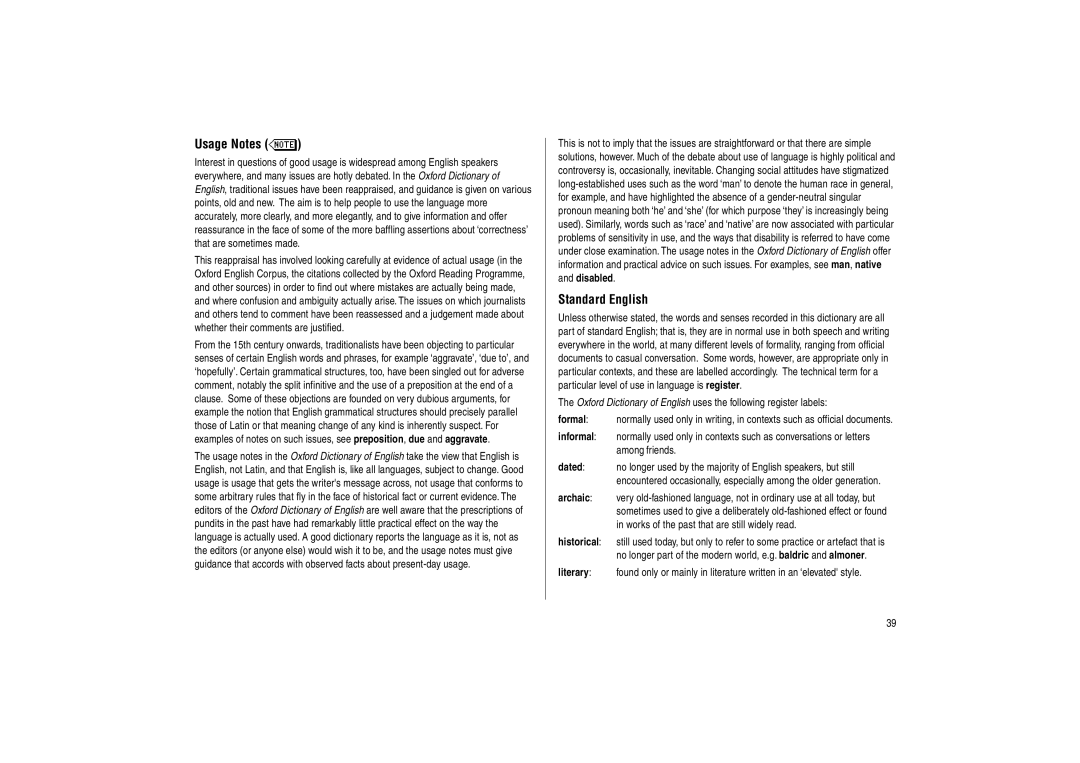Usage Notes ( )
)
Interest in questions of good usage is widespread among English speakers everywhere, and many issues are hotly debated. In the Oxford Dictionary of English, traditional issues have been reappraised, and guidance is given on various points, old and new. The aim is to help people to use the language more accurately, more clearly, and more elegantly, and to give information and offer reassurance in the face of some of the more baffling assertions about ‘correctness’ that are sometimes made.
This reappraisal has involved looking carefully at evidence of actual usage (in the Oxford English Corpus, the citations collected by the Oxford Reading Programme, and other sources) in order to find out where mistakes are actually being made, and where confusion and ambiguity actually arise. The issues on which journalists and others tend to comment have been reassessed and a judgement made about whether their comments are justified.
From the 15th century onwards, traditionalists have been objecting to particular senses of certain English words and phrases, for example ‘aggravate’, ‘due to’, and ‘hopefully’. Certain grammatical structures, too, have been singled out for adverse comment, notably the split infinitive and the use of a preposition at the end of a clause. Some of these objections are founded on very dubious arguments, for example the notion that English grammatical structures should precisely parallel those of Latin or that meaning change of any kind is inherently suspect. For examples of notes on such issues, see preposition, due and aggravate.
The usage notes in the Oxford Dictionary of English take the view that English is English, not Latin, and that English is, like all languages, subject to change. Good usage is usage that gets the writer's message across, not usage that conforms to some arbitrary rules that fly in the face of historical fact or current evidence. The editors of the Oxford Dictionary of English are well aware that the prescriptions of pundits in the past have had remarkably little practical effect on the way the language is actually used. A good dictionary reports the language as it is, not as the editors (or anyone else) would wish it to be, and the usage notes must give guidance that accords with observed facts about
This is not to imply that the issues are straightforward or that there are simple solutions, however. Much of the debate about use of language is highly political and controversy is, occasionally, inevitable. Changing social attitudes have stigmatized
Standard English
Unless otherwise stated, the words and senses recorded in this dictionary are all part of standard English; that is, they are in normal use in both speech and writing everywhere in the world, at many different levels of formality, ranging from official documents to casual conversation. Some words, however, are appropriate only in particular contexts, and these are labelled accordingly. The technical term for a particular level of use in language is register.
The Oxford Dictionary of English uses the following register labels:
formal: normally used only in writing, in contexts such as official documents.
informal: normally used only in contexts such as conversations or letters among friends.
dated: no longer used by the majority of English speakers, but still encountered occasionally, especially among the older generation.
archaic: very
historical: still used today, but only to refer to some practice or artefact that is no longer part of the modern world, e.g. baldric and almoner.
literary: found only or mainly in literature written in an ‘elevated' style.
39
